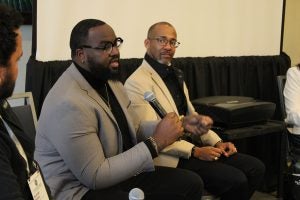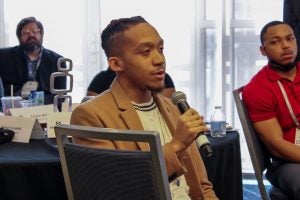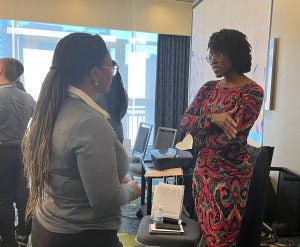In February, I had the pleasure to be among some of the greatest thought leaders and visionaries for agriculture — and they were all college students.
As part of the MANRRS Agriculture Policy Summit, 23 students traveled to Washington, D.C., to attend the National Association of State Departments of Agriculture’s Winter Policy Conference. The Ag Policy Summit is an annual event hosted by MANRRS (Minorities in Agriculture, Natural Resources and Related Sciences), NASDA, and the NASDA Foundation to support college students interested in pursuing careers in agriculture policy. This year’s conference was significant as policymakers across the country prepare for the 2023 Farm Bill.
While I have worked in food and agricultural policy in the Washington area for several months, this was my first opportunity to network with such a dynamic group of current and future ag policy professionals. I was inspired by the passion and diverse perspectives my peers brought to the summit.

Stephon Fitzpatrick currently serves as the Executive Director of the Pennsylvania Commission for Agriculture Education and MANRRS Graduate Student President.
“MANRRS has served as a critical springboard for minorities looking to pursue and engage in educational and professionals opportunities,” Fitzpatrick stated. “My daily profession centers around ag policy, and the Ag Policy Summit is a great opportunity for young professionals to meet leaders of all backgrounds and gain insight and motivation to pursue this industry.”
During the policy summit, he served as a panelist discussing his professional journey in agricultural policy. Fitzpatrick spoke about being unapologetically himself as a Black man in the agriculture industry. This stuck with me and other students, especially Emmanuel Wallace.
Emmanuel Wallace attended the first policy summit in February 2020. Wallace is now a graduating senior at Tennessee State University pursuing a degree in agricultural sciences and a minor in political science. He feels more focused and engaged in conversations around agriculture policy.
“I applied to the policy summit because I wanted to get lived experiences and professional’s perspectives on agricultural policy,” Wallace stated. “My school does not have an agriculture policy program, so I appreciate the opportunity to directly engage in conversations on policies like supply chain and the upcoming Farm Bill.”

During the summit, we also had the opportunity to attend various sessions hosted by NASDA alongside state secretaries and commissioners of agriculture. We were among the first to hear CEO Ted McKinney announce NASDA’s Farm Bill Priorities during the open plenary. Witnessing how agriculture advocacy worked on the state and national level helped me see how integrated the food and agriculture industry is. During this time, we found out that each of the MANRRS Ag Policy attendees would be receiving a $1,000 scholarship.
Tayler Curry, a senior agriculture business student at Tuskegee University, was especially surprised.
“The conference as a whole was an invaluable experience. The scholarship and the Ag Policy Summit demonstrated to me how much the MANRRS and NASDA organization were invested in our future. I sincerely appreciate their belief in our success as future agricultural leaders.”

Investments like these are critical in ensuring that the future of agriculture remains engaged and inspired. As policymakers and producers collaborate to address some of the country’s and world’s biggest challenges, like addressing climate change and supporting technological and business innovation, diverse perspectives must be not only included but valued.
In my reflection, I thought about how challenging it can be to pursue careers in the agriculture industry without support. Agriculture touches every life across this nation, not only those of us who grew up on farms or have had more traditional pathways to the agriculture industry.
Because of the support of organizations like MANRRS and mentors I have had throughout college and graduate school, I have been able to pursue my passion. I always thought there were not many people who looked like me working in agriculture policy. I am grateful for this experience because it showed me that so many people are invested in my success today.
Irene Lewis is a recent Master’s student in the John Glenn College of Public Affairs at The Ohio State University with a major in public administration with a focus on public policy and management. She is a south Louisiana native and food justice and access advocate.




